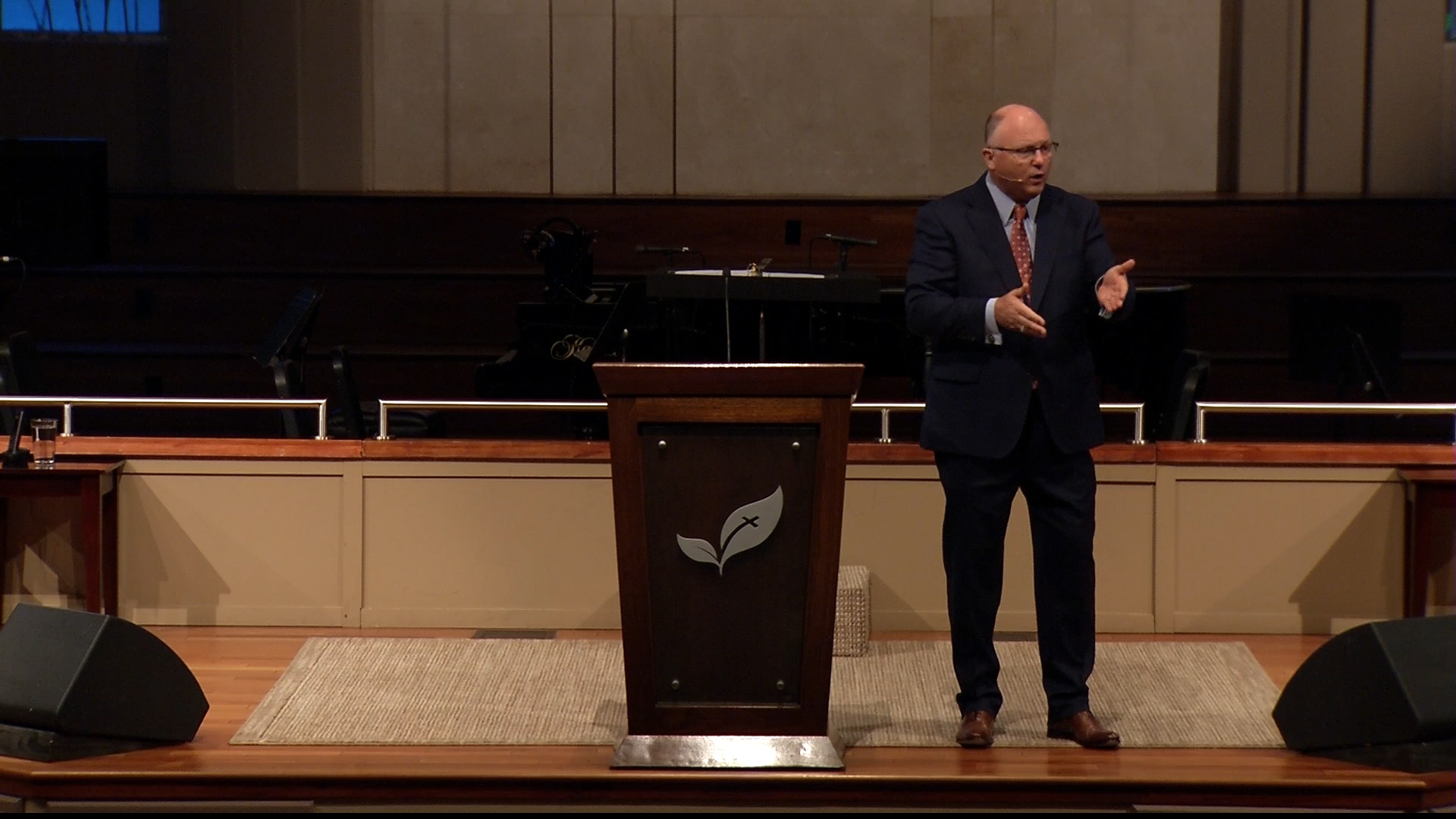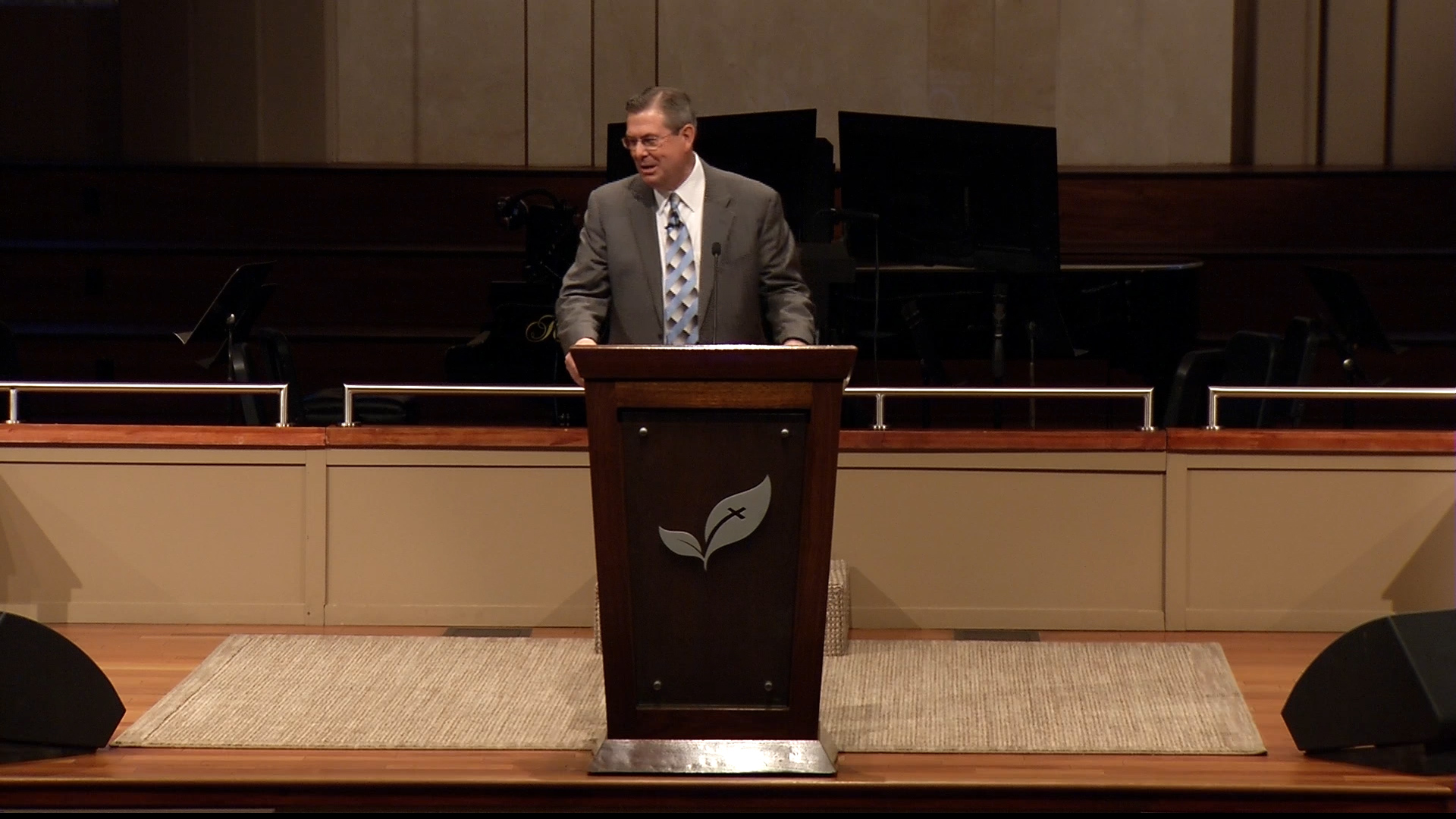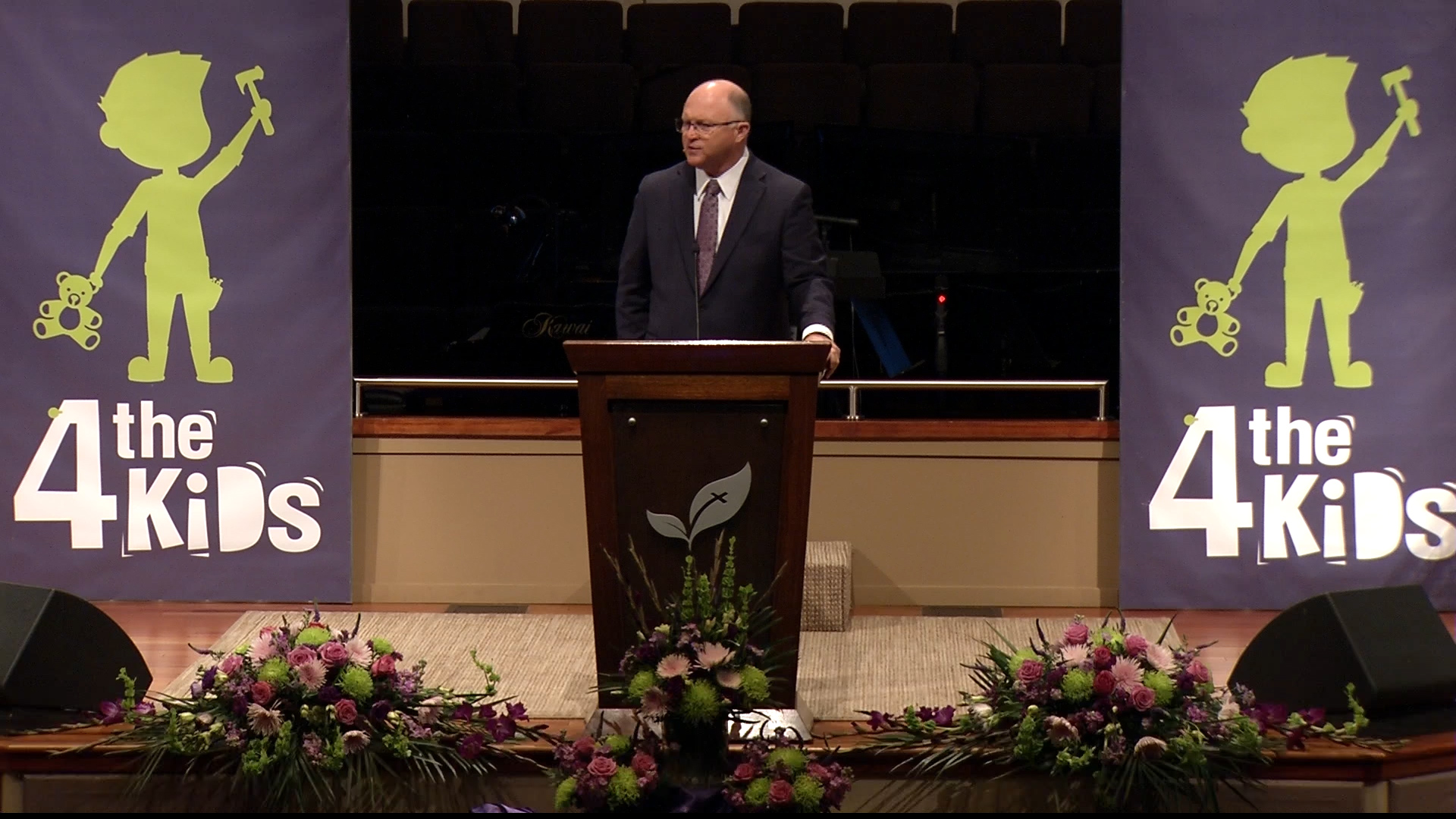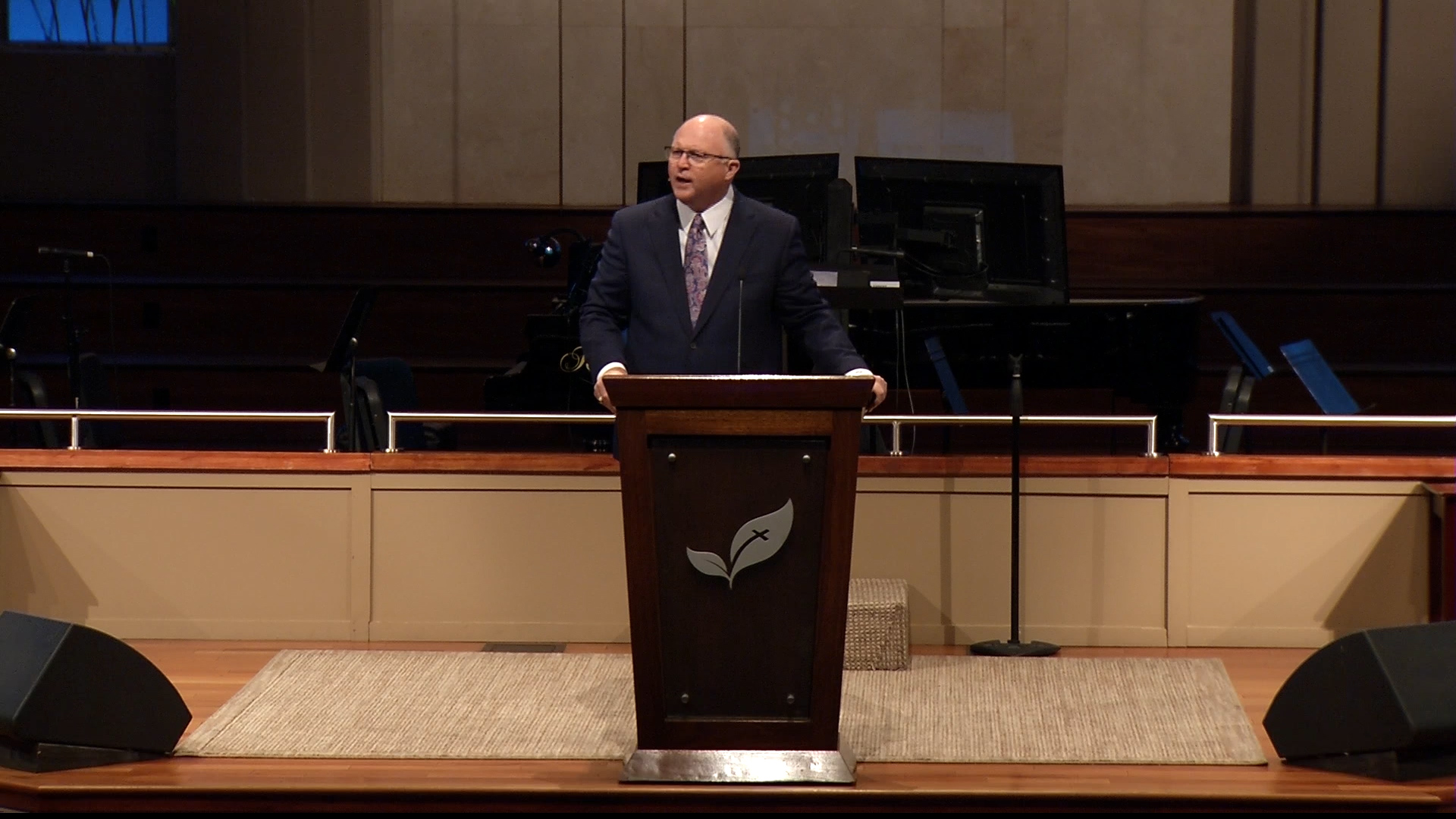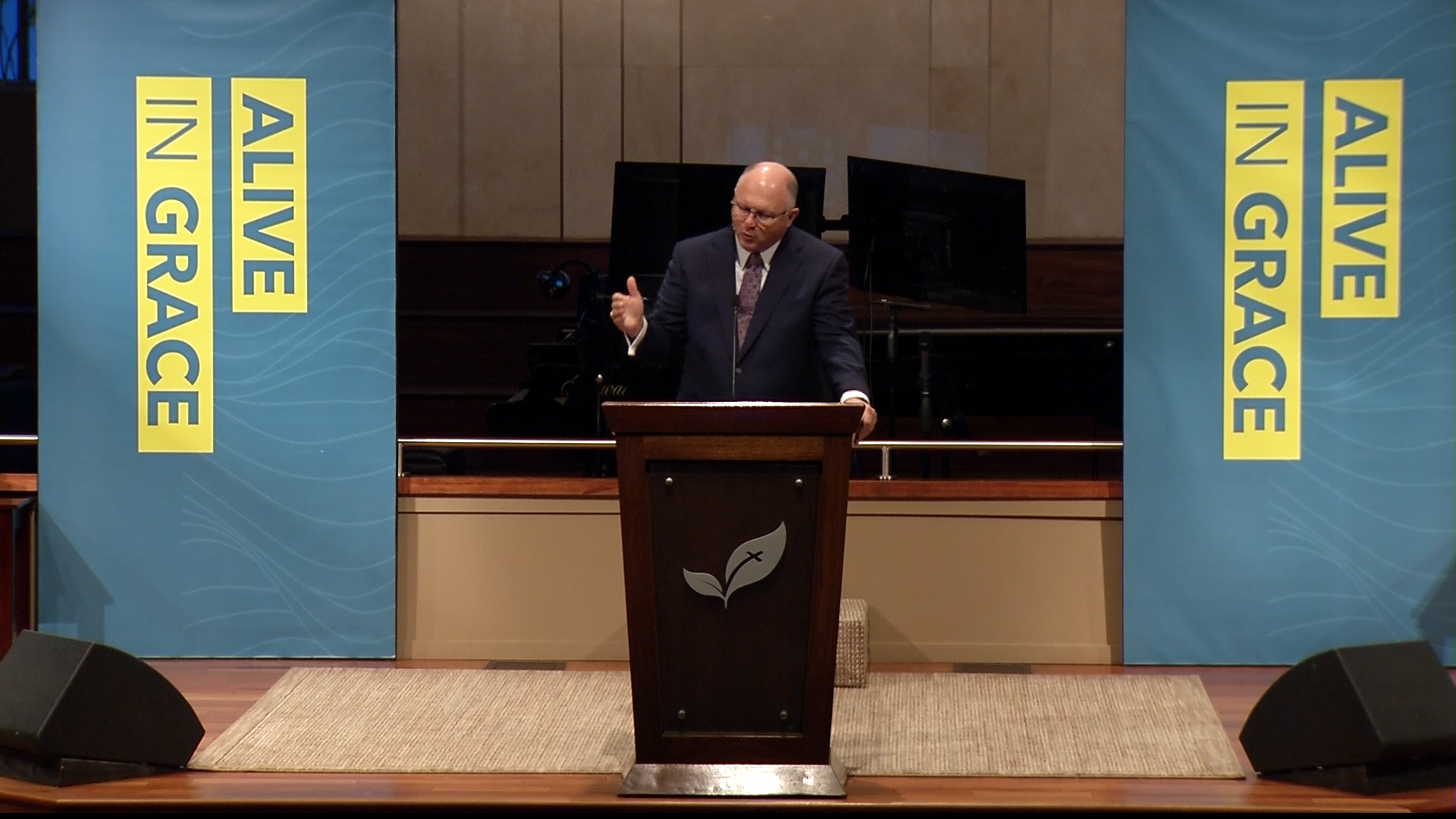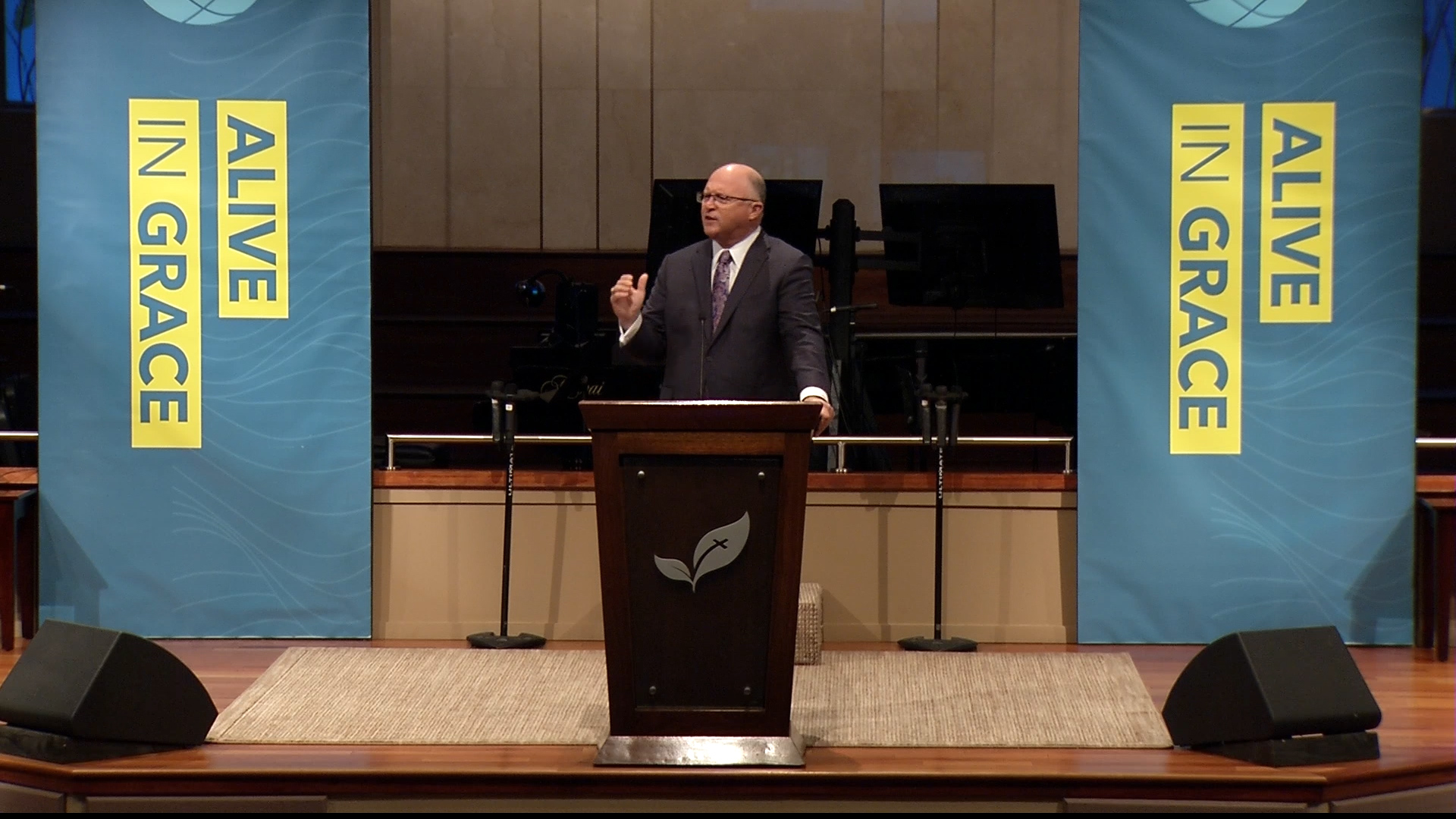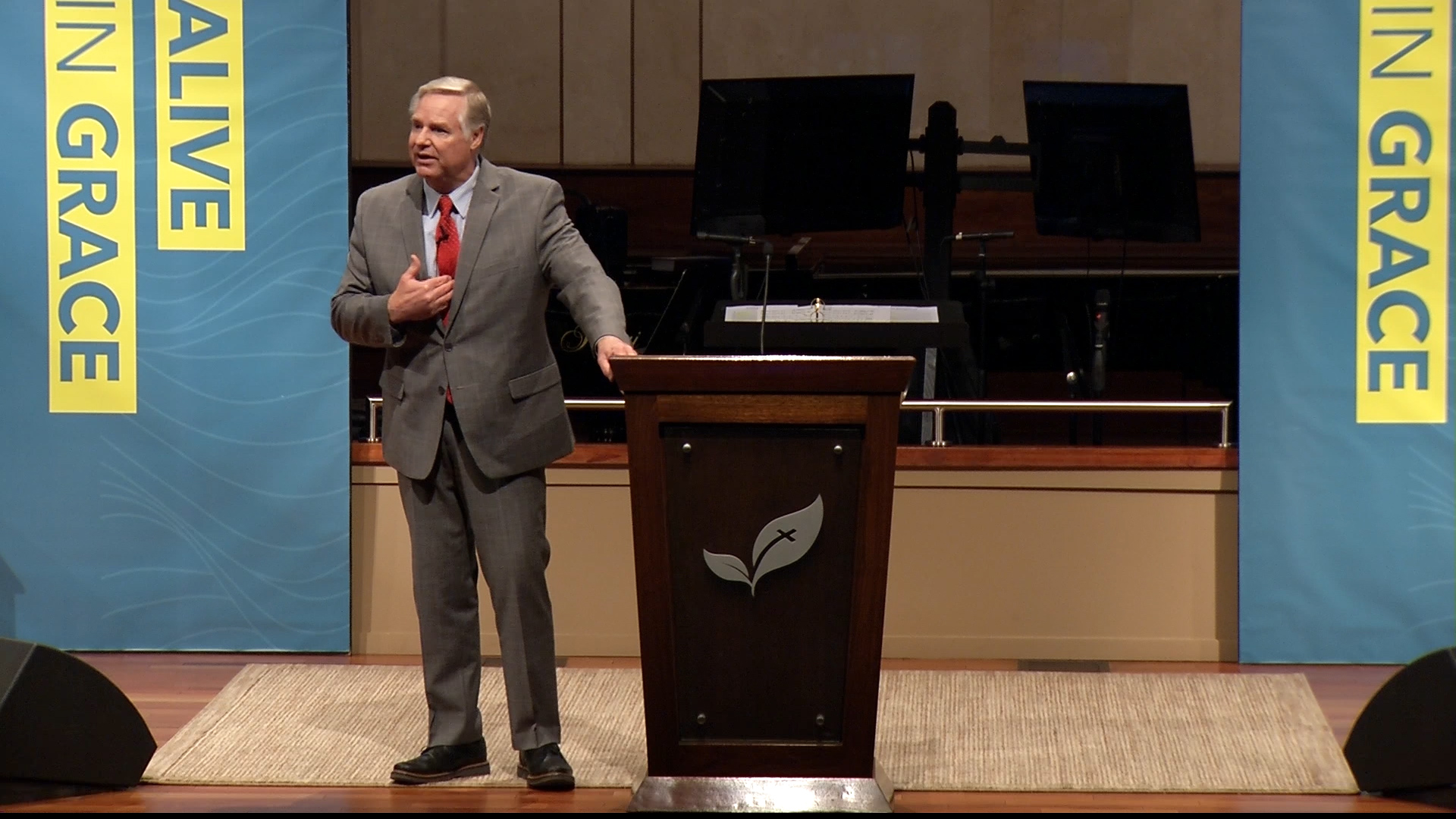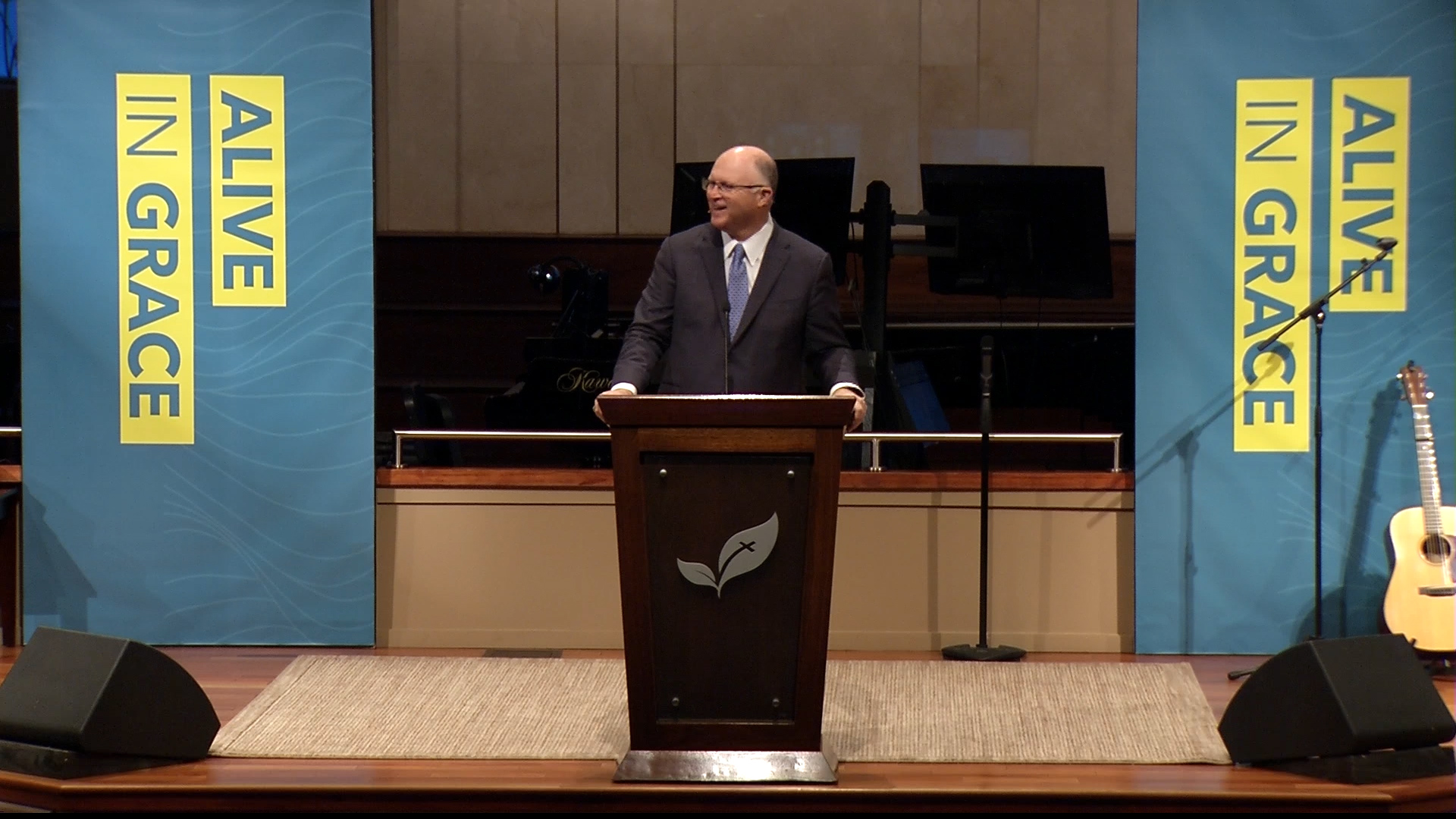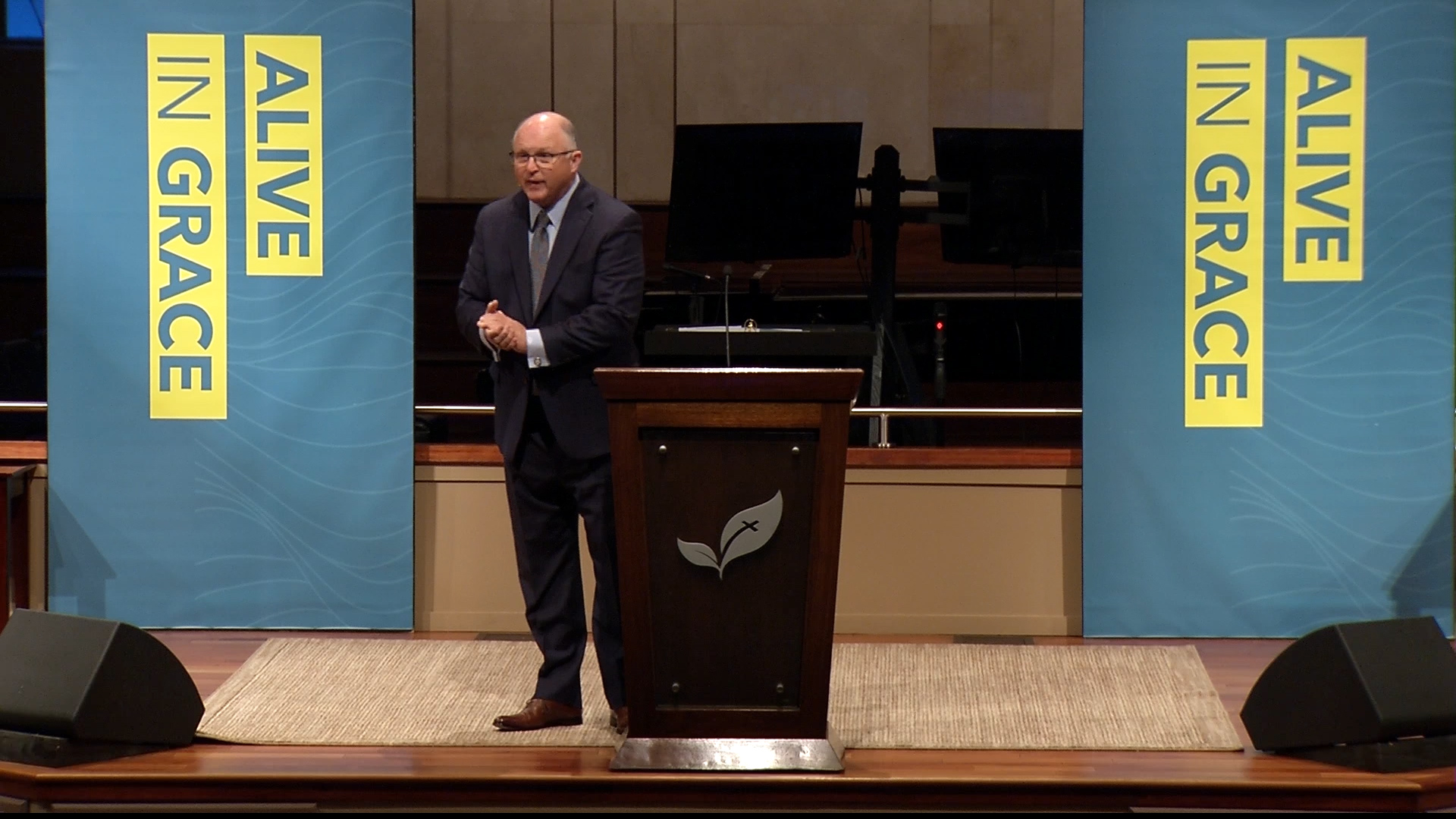Take your Bibles, turn to the book of Luke chapter 12 this morning, and I do want to report to you that as of a month or so ago that we have all the funds needed for the Eldon Lofgren Transportation Facility. You're going to see the steel going up on that in a few weeks. We're a little behind because of the rain. But how many of you are glad for the rain? Amen. It's been nice, and we're thankful for that. But we're focusing 100 percent of this offering on the Kid City Building, and I do ask you to continue to pray.
We're going to read this morning from Luke 12, beginning in verse 13, and I would like to speak this morning on the subject "Grace to Trust. Grace to Trust." And so, we're going to read about a man who really had trouble trusting. And I know that there are men like that in this room today, and you've got to have your Plan A, B and C. And today we're going to learn, "What does it mean to really trust God?" And so we're going to read in Luke chapter 12, verse 13 and down through verse 21.
"And one of the company said unto him, 'Master, speak to my brother, that he divide the inheritance with me.' And he said unto him, 'Man, who made me a judge or a divider over you?' And he said unto them, 'Take heed, and beware of covetousness: for a man's life consisteth not in the abundance of the things which he possesseth.'
"And he spake a parable unto them, saying, 'The ground of a certain rich man brought forth plentifully: and he thought within himself, saying, "What shall I do, because I have no room where to bestow my fruits?" And he said, "This will I do: I will pull down my barns, and build greater; and there will I bestow all my fruits and goods." And I will say to my soul, "Soul, thou hast much goods laid up for many years; take thine ease, eat, drink, and be merry."' But God said unto him, 'Thou fool, this night thy soul shall be required of thee: then whose shall those things be, which thou hast provided?' So is he that layeth up treasure for himself, and is not rich toward God." Let's pray about it, shall we?
Father, would you give us grace to trust you? Would you teach us this morning really about the right priorities for life and for the life eternal? And would you help some today to grow in their grace and in their faith, that we might be a people strong in you, and I pray this in Jesus' precious name. Amen. You may be seated.
One of the early hymns that I learned in my Christian life was a hymn that has helped me many, many times, and that is the hymn "Tis so Sweet to Trust in Jesus." And when you sing the chorus of that hymn, it says, "Jesus, Jesus, how I trust him; how I've proved him o'er and o'er. Jesus, Jesus, precious Jesus!" Say it with me, "O for grace to trust him more, to trust him more."
Now some of you have trusted him with your soul's keeping. You have said, "Jesus, if I have a hope in going to heaven, then I trust you to take me to heaven. But then we say, "But, Lord, I don't know if I can trust you with my finances. I don't know if I can trust you with my relationship."
Some of us need grace today to trust him more. We've trusted him with certain things, but we need grace to trust him more. You see, God's grace is an enablement from within to help us to walk in a life of trust.
As you read Luke 11 and 12, you'll find Jesus as he's talking with the Pharisees and the Sadducees, and they are trying to catch him in contradictions along the way. The Bible tells us in verse 1 of chapter 12 that there gathered an innumerable multitude of people around Jesus. They wanted to hear what he would say to the Sadducees and to the Pharisees. And as Jesus was speaking to this huge crowd, the Bible tells us in verse 13 that there was one of the company who spoke out to Jesus.
Now that very thought kind of freaks me out, because I don't know about you, but if I'm in a big crowd standing in front of the Son of God, I'm not just going to go, "Excuse me, I've got a matter to bring up to you." Now I see people that do stuff like that and I want to say something like, "Dude, slow down a little bit. That's embarrassing, right? At least raise your hand or wait for your turn."
But apparently this man just speaks out. Look what he says in verse 13: "Master, speak to my brother, that he may divide the inheritance with me." He's calling out to Jesus and he says, "Look, I know that you're a man of authority. Talk to my brother about the money issue, because I want him to divide the inheritance with me. God, I know you can take care of this."
And so, he calls out to Jesus Christ. And Jesus is going to teach this man a great deal. I want you to see what he tells him. In verse 15, he says, "Take heed, and beware of covetousness: for a man's life consisteth not in the abundance of things which he possesseth."
Now God knows our hearts. You know, some guys have this philosophy: "He with the most toys wins," right? And God knows that this man is thinking only about the material. And so Jesus is going to share a parable with him.
Now a parable or parabolic teaching was Jesus' way of answering a question and putting it down on the lower shelf so that everybody could understand and see clearly the answer to the question at hand. That's why Jesus gave over 25 parables, and 16 of those parables dealt with the issue of money, because where your treasure is, that's where your heart is also.
And sometimes people say, "I don't think that they ought to talk about money in church," and I get that. And I take a few weeks every to preach about stewardship. But you need to understand that Jesus, 16 out of 25 parables, talked about it because he knew that how you handle your money is a reflection of your heart.
And I know what people say today. "You know what; just give me Jesus, don't give me the rest of it." But I'm telling you, when you get Jesus you'll want the rest of it. And here we see that Jesus goes right to the heart of this man. And I want you to hear what Jesus says, he uses kind of a farm illustration with him.
Verse 16: "He spake a parable unto them, saying, 'The ground of a certain rich man brought forth plentifully: and he thought within himself, saying, "What shall I do, because I have no room where to bestow my fruits?" And he said, "This will I do: I will pull down my barns, and build greater; and there will I bestow all my fruits and my goods. And I will say to my soul, 'Soul, thou hast much goods laid up for many years; take thine ease, eat, drink, and be merry.'"'"
Now if you're taking notes this morning, I want you to take note, first of all, of the priority of the worldly man, the priority of the man that's living for this world. What is his priority really like? And I really think the priority is revealed in his thoughts.
And how many of you are glad today that your thoughts are not going to flash up on that screen this morning, right? I mean, you're not going to flash up there, "How long is this sermon going to last?" "Why is she wearing that?" "What's for lunch?" We don't want all of our thoughts up on the screen, right?
But God knows our thoughts. How many of you believe that this morning? And here we see the thoughts of this man in verses 16 and 17: "He thought within himself, saying, 'What shall I do?'"
Now the Bible says that our thoughts, Colossians 3, should be heavenward: "Set you affection on things above." How many of you believe that? Come on, you've got to help me here. How many of you believe the Bible says – it's in your notes in case you don't know what the Bible says on that passage, Colossians 3: "Set your affection on the things that are above." How many of you believe God wants our love and affection to be a heavenly love? Do you believe that? Okay.
But this man, he wasn't there yet. I mean, he was all about his barns, he was all about himself. He lived by sight and he lived for himself. In fact, if you were to look at verses 17-19, in those three little verses you'll find that there are eleven personal pronouns. Eleven times in three verses he talks about himself.
Have you ever been with somebody that all they want to talk about is themselves? How many of you know what I'm talking about? I mean, they drove the fastest, they have the best car, they know so-and-so; they've done this, they've done that. And look at this guy; he says in verse 17, "What shall I do? I have no room. My fruits." Verse 18, "What shall I do? I will pull down my barns. I will bestow my fruits, my goods. I will say to my soul." Eleven times this man is talking about himself. He's talking about his desires. He's wrapped up in himself. Not one time did he ever give God the credit for his crops.
And many men are like that: "We deserve our job, we have the degree. We do the job better." We don't pause to remember it's God that gives us these blessings. He never thanked God for the soil, the rainfall, the sunlight, the lack of pestilence, the lack of disease that had not come on his property. He was presumptuous concerning the future when he said, "This is what I will do. I will pull down my barns. I have a plan.
Psalm 49:11, "There inward thought is that their houses shall continue forever and their dwelling places to all generations; they called their lands after their own names." And sometimes this is how we think. And I don't know why all of us can get stuck in this rut of thinking, "I've got to collect enough so that I can eat, drink, and be merry. I've got to get this investment, that investment. I've got to get all these plans."
Now I'm not preaching this morning against investments, and I'm not preaching against planning, because God has taught us also to consider the cost. He says, "A rich man retaineth riches." But the fact of the matter is though a wise man retaineth riches, God blesses us to be a blessing. It's not all about ourselves. But this man, he really had a problem; and we see that his priorities were revealed in his thoughts. He thought in his inward parts that he would kind of live forever.
If you could just follow with me for a week or two, you'd find yourself every few days along the bedside of someone very ill. Or maybe you'd come with us to a funeral service, and you'd begin to see what we often see in the ministry, and that is that life is but a vapor. The Bible says it's here for a little while, then it's gone. And this is why God wants us not to think only of now, he wants us to think of eternity. He wants us to think of little children that should the Lord tarry in his coming will be living and preaching the gospel when we're already in heaven. He want us to have a heavenly viewpoint.
This man, his thoughts were very revealing. But notice, secondly, revealed in his plans. His priority was revealed in his plans. Look at his plan, verse 19: "I will say to my soul, 'Soul, thou hast much goods laid up for many years; take thine ease, eat, drink, and be merry.'"
Now I'm not preaching against planning, I'm a planner, right? I plan my day, my week, my month, my year. I plan; I believe in planning; I teach planning to our staff. But I want you to understand that there is a danger in too much planning; and the danger in too much planning is that we can leave God out of our plan. And he said, "This is what I'm going to do; I'm going to build a new barn, and then I'm going to get enough stuff and I'll have enough in my 401K and I'll have enough in my investments, that I can say, 'Eat, drink, and be merry.'"
The problem is not planning, the problem was that his planning left God out. He wasn't asking God to make him successful so that he could be a blessing, he was asking that he would be successful only for himself. He had what we sometimes call a scarcity mentality. His mentality was, "I've got to get as much as I can get for the rainy day," rather than abundance mentality.
An abundance mentality says, "I want to invest so that I can be ready to give. I want to possess so that I can be willing to distribute." He had really a false sense of security. He thought, "You know what, I want to have goods laid up for many years." But the Bible says in Ecclesiastes 5:10, "He that loveth silver shall not be satisfied with silver; nor he that loveth abundance with increase: this is also vanity." Someone said, "If you make money your god, it will plague you like the Devil. You'll never have enough; it will always worry you."
And many times, frankly, someone that just gets a whole bunch of money, it's not always the best thing. In fact, some of you might recall some of the stories from those that have won the lottery. William Post won $16 million in 1988. He was sued later by a former girlfriend who wanted the money, and his brother hired a hitman hoping to murder him and inherit it. He was $1 million in debt in a year, and later went to jail for shooting a gun over a bill collector's head. He called winning the money a nightmare. He died in 2006 after declaring bankruptcy. You see what tithing can help you avoid? Jeffery Dampier won $20 million in 1996. He bought houses for relatives. Several years later a sister-in-law and her boyfriend kidnapped and murdered him for the money.
Now the Bible says, "Charge those that are rich in this world, that they be not high-minded, " so I want you to see this in your notes, 1 Timothy 6:17, "that they be not high-minded, nor trust in uncertain riches," and that's what we're talking about this morning, that our trust in not in those barns and riches. And it says, "But in the living God," watch this now, "who giveth us richly all things to enjoy."
Now I want you to notice, God is going to give you your salary, he's going to give you things. He says, "I want you to enjoy those things," right? We're not preaching for abundance or against abundance, we're just saying you work, you sell something, you get a commission, you get a paycheck; praise the Lord, enjoy the blessing of God.
But what else do we do with it? Notice the next verse, verse 18, "that they do good, that they be rich in good works, ready to distribute, willing to communicate." So God says, "I'm blessing you so you can be a blessing. I want you to enjoy what I give you, but I then want you to do good, and I want you to be rich in good works, and I want you to be ready to distribute and willing to communicate."
Now the word "communicate" means to give. If we have a missionary come by and he's had a broken down car, and we take an offering for the missionary and his car gets going, we communicate to him and communicate that we love him and that we're behind him. And God says, "I'm going to bless you; and as I bless you, I want you to be willing to communicate." I don't want you to come to the Kid's offering, "Yeah, all right, let's see how much we're going to have to give here." God says, "I want you to be willing to do this."
The happiest Christians I know are giving Christians. People that have come to the place of realizing, "You know what; yeah, I'm going to set some aside for savings and I believe in planning. But fundamentally, I believe that God blesses me to be a steward, because he wants me to be a blessing in other ways, and that's the purpose that God has in giving to me."
The priority of the worldly man, all he sees is himself, his barns, getting more, so he can eat, drink, and be merry. He wants to turn 65 and get on a cruise ship and weight 500 pounds a year later and just enjoy every bit of it. I'm not preaching against cruise ships. I'm not preaching against being 500 pounds. I'm just saying there's more to this matter of getting things than just bringing it all to ourselves. The worldly man doesn't think biblically.
But notice, secondly, the pronouncement of God. Now here we see this parable, and we hear what this man is saying in the parable. Look what it says in verse 20: "But God said unto him, 'Thou fool, this night thy soul shall be required of thee: then whose shall those things be, which thou hast provided?'" God says, "What a ridiculous way to live, just for the now and now. What if your soul is required of you? What if your life ended today? What have you done that really matters for eternity?"
So the pronouncement of God, first of all, is regarding judgment, regarding the matter of judgment. He says, "I want you to remember, you're going to stand before God someday. You're going to give an account someday." Matthew 16:26, "What is a man profited, if he shall gain the whole world, and lose his own soul? Or what shall a man give in exchange for his soul?"
Daniel Webster, one of our country's early founders, lived by this motto – it's in your notes: "My greatest thought is my accountability to God," right? Now I know there's different people today in churches that are teaching certain doctrines of grace and certain loose living styles as if we're never going to have to give an account for the way that we steward what God has given to us. But the Bible is replete with Scriptures that teach that there is a place called the judgment seat of Christ, and we're going to give an account for opportunities that have been given to us.
And Daniel Webster said, "My greatest thought is my accountability to God." Let's say that together: "My greatest thought is my accountability to God." One day I'll give an account to the Lord for his blessings. So regarding the judgment of God there is this pronouncement, "Thou fool, you forget that you're going to stand before the Lord."
Notice, secondly, regarding stewardship. It says, "Then who shall those things be, which thou hast provided?" In other words, "If you're not here, then what about all this stuff? What have you done with it? What are your thoughts about it?"
Look at Luke 16:1, "And he said unto his disciples, 'There was a certain rich man, which had a steward; and the same was accused unto him that had wasted his goods. And he called, and said unto him, "How is it that I hear this of thee? Give an account of thy stewardship; for thou mayest be no longer a steward."'"
You see, the principle in the Bible is that we're going to give an account for our stewardship. All of the blessings that God has given to us, the Bible says in Hebrews 13:17 one day I will give an account for being a pastor here. I'll stand before the Lord and I'll give an account for the way I lead this church. And all of us should live our lives with that accounting in mind.
Now a few weeks ago we had our CPA firm come through the church here, and they set up shop in our conference room, and they asked our staff for all kinds of books and computer access. And we have our annual audit, it's a full audit; and thank the Lord for the wonderful report they bring and give to our deacons year after year, and for the great job our staff does. But when the auditors come to study our stewardship, they're not primarily looking for the volume of finances, they're looking for the accuracy and the stewardship with which the finances are kept. They're looking to the policies and the purchase orders and the processes of the ministry. They want to know that we are stewarding well.
And what I'm saying to you this morning, it doesn't matter if you make $10.00 an hour or $100,000.00 a year; what God is interested in is, "How are you handling his money?" because it's not yours and it's not mine. He's the owner, we're just the stewards, we're the managers of it.
And so we see that regarding stewardship, this man has to hear a pronouncement from God. He says, "Look, you've got it all wrong. What if life ends today. You're going to have to give an account for the way you've lived." And so we see the priority of a worldly man, all he thinks about is, "Me, mine. Me, mine," right?
And then we see the pronouncement of God. "Wait a minute; life's going to end. You'd better think about eternity." And so that brings us finally to really the heart of our message, and that is the pathway to trust. You remember what we're talking about today: "Grace to Trust Him More." How can we develop that life of trust that meets the needs of today, and even the plans for tomorrow, but really lives with eternity in mind? What's the pathway to that style of life? What is the pathway? What is God's counsel to this man?
Now the first – and this is key; if you get nothing else, get this – is that if you want to live with eternity in mind, if you want to live obediently to the Lord, then you must first practice reverential trust. You must learn to trust God, trust in the Lord. Look at Luke 12:22, "He said unto his disciples, 'Therefore I say unto you, take no thought for your life, what ye shall eat; neither for the body, what ye shall put on."
Now I want you to see a phrase here, and this phrase several years ago just struck my heart. I'm going to tell you what it is, it's in verse 22. You might want to find it right now while I'm talking. I mean, this meant so much to me I put it on a card, I put it in my pocket, and now it's under the glass on my desk; that's how important this phrase is to me. And how many of you know what I mean, glass on top of my desk, right? You slip it right under there; if your desk is clean you see it very regularly.
And here's what I have under my desk, these words: "Take no thought." Would you say that with me? "Take no thought," because I think a lot, and I plan a lot, and sometimes I worry about things. Sometimes as a pastor I worry for the flock: "Where were those folks? I didn't see them in their spot."
Well, what about this need for tomorrow? And what about that family that's going through that tough time? How are we going to pay the bill this summer? And what are we going to do for that missionary? What about my children and my grandchild? I'm like you, I have a lot of thoughts.
And sometimes Type A personalities think polyphasically. I mean, we're just thinking stuff all the time. Sometimes you'll wake up in the middle of the night. When I was going through a season in my life I read this Scripture, "Take no thought." You know what it means don't you? It means stop worrying. And sometimes we take too much thought; and many Christians in 2019 are giving less than they could, not because you're making less, but because you're worrying more.
Now I didn't fall off the turnip truck yesterday, I don't make it a matter of checking everybody's giving; I just know there's people here right now who do not give. There are some who don't think they can give. And sometimes the reason for that is we're taking so much thought and we're so full of worry, and like I was when I was 20 and began tithing. When I began tithing 37 years ago I thought, "How can this work?" and someone said, "Just trust the Lord with all your heart."
And Terrie and I made a decision that we would honor God, and that we would honor him with the firstfruits of everything he gave to us. We began to practice trust. And I'm glad we did, because when you're trusting God you get to see him meet so many needs in so many wonderful ways. And if you don't trust God you're full of worry and anxiety, and that can negatively affect even a marriage.
I heard about a couple that was having a heated discussion regarding their family finances. And finally the husband exploded. He said, "You know, if it weren't for my money, this television set would not even be here right now." And he said, "If it weren't for my money, that chair you're sitting in wouldn't even be there right now. And if it weren't for my money, this house wouldn't have even been built, it wouldn't even be here right now."
And the wife looked at him and said, "Are you kidding? If it weren't for your money, I wouldn't even be here right now." A lot of people have trouble with money issues, you know. But when two people come together and start trusting God, it really makes a big difference in their life.
I remember when Jon and Kristine I got married – I think they're back there – and Kristine was talking to me one day, and she said, "Dad, did you know that there's a way that if you charge on a credit card that it can be emailed to someone else?" She said, "My husband," they'd been married like a few weeks, "every time I charge it goes right to Jon, and it emails him what I just spent." I said, "Yeah. Go get a pedicure and see how that works."
She did; Jon got it right on his computer. And I was kind of kidding around with him. And what are they trying to do? They're trying to steward. But you know what; because they honor God in tithes and offerings, they get to put him first in their life and they've seen God bless in their life and in their ministry. Stop worrying, but start trusting God. "How's it going to work?" I can't tell you; just trust the Lord. Consider God's provision: "Trust in the Lord with all thy heart."
Look at how God provides, look at verse 24: "Consider the ravens." Let's say that together, shall we? "Consider the ravens: for they neither sow nor reap; which neither have storehouse nor barn; but God feedeth them."
Now I've lived in the valley here for more than three decades, and I've got to tell you, I have seen a lot of ravens. How many of you seen the ravens around the Antelope Valley? Anybody like me? I mean, I tell you, I look at our trashcan sometimes, it's got a little overflowing in there and stuff. So I go push that trashcan down, then I close the lid, then I put a big, big rock, maybe a 30-pound rock on top of that trashcan. And a raven comes and jumps on the trashcan, and with one movement of the beak, boom, throws that 30-pound rock right off. That's the kind of ravens.
I've seen ravens flying around this valley with Walmart bags and with refrigerators, carrying them around. I'm telling you, I've never seen a skinny raven in Lancaster not one time. We have some healthy ravens up here in this desert, and God says, "Okay, you're worried about trusting me. You've got to fill up your barn, you've got to get all your goals met. That's why you can't give to the Kid City offering because you've got all these goals, right? Why don't you just look at the ravens. They don't get up worrying about food; they're going to go to Pastor's house and get it out of his trashcan. They already know what they're going to do."
And then he says in another verse here. In verse 27, he says, "Okay, look, why don't you just consider the grass of the field. Why don't you consider the lilies how they grow. God takes care of it." Just some of you as you see the flowers coming up over these next few months, just remember, God will take care of you as well. God will meet your every need; God will provide. So we need to learn, first and foremost, how to trust God. This is not really a series about stewardship and giving fundamentally, it's about just trusting God. Can we trust God with tithing and with offerings?
And then let me say finally as we close, we must prioritize our eternal investments, we must prioritize our eternal investments. Now I want you to look here at a couple verses. Look at verse 31: "But rather seek ye the kingdom of God; and all these things shall be added unto you." And then notice also, if you would, as you look down in this passage at verse 33, the Bible says, "Sell ye what you have, give alms; provide yourselves bags which wax not old, the treasure in the heavens that faileth not, where no thief approacheth, neither moth corrupteth. For where your treasure is, there will your heart be also."
Now can I tell you that stewardship is not about building the Kid City Building, it's about building your trust. And one of the reasons that we have some really strong Christians at Lancaster Baptist Church is because they've learned how to trust God with their finances. They've learned that God will take care of them. And the strength of the church is not found in the building, it's found in the hearts of God's people, people that have made these particular investments.
Now the Lord does not condemn the man for savings, he does not condemn him for saving; he only is condemning him for not having eternal savings, for not thinking of the things in the next life. In fact, Proverbs 11:16 says, "A strong man retains riches." But our saving and our investing should only enhance our giving. And we should use our affluence for eternal influence. Let me say that again: "Use our affluence for eternal influence," right? And God blesses us to be a blessing.
So how do we prioritize this? Let me give you two ways. First of all, we prioritize it in our systematic giving or our weekly giving. Even unsaved people know that Christians are supposed to tithe. Even people that don't believe in God know that, right? And the Bible says in 1 Corinthians 16:2, "Upon the first day of the week," that's Sunday, "let every one of you." Now in the Greek that means "every one of you." All right, I want to make sure we all get that.
So, "On the first day of the week, let every one of you lay by him in store." In the Old Testament the storehouse was the temple. In the New Testament, it's the local church. And it says this, "as God hath prospered him, that there be no gatherings when I come." So when I gave in the first service this morning, on the top line of that envelope, I just put down my tithe, my grace offering, if you want to call it that, and I put that amount there and placed that into the offering. That's the firstfruits.
Look in your notes, Proverbs 3:9-10, "Honour the Lord with thy substance, and with the firstfruits of all thine increase." The firstfruits, that's the tithe, the very first. You make $100.00, you give God $10.00, and that's the firstfruit. Upon the first day of the week you give God your firstfruits.
Now some folks have begun doing that in our church online, and it's been very helpful for them. And I want to just share with some of you just quickly. If you'd like to learn how to just automate that, what, about 45 percent of our members are doing now online. Let's watch a little video together.
[Video played, 0:31:22 to 0:31:53]
Now right in front of you this morning there's a little card in your chair there that just talks about online giving, how you can do that. Some people give weekly through text giving. But I want to encourage you to consider automating your giving.
For example, some people think like this: "Oh, my car payment; I don't want to forget that. I don't want to have a tow truck come and take my car away in repossession, so I'm going to automatically send $322.00 every month to the Ford Automotive Company, because I don't want to lose my car. I'm going to automate it because that's a big priority."
But here's the problem: we view God as a discretionary issue. We view our giving to the Lord as discretionary. In other words, "If I can, if I want to, I'm going to do that," that's discretionary. My car, now that's a priority. And what we're talking about this morning is saying, "God, you are the priority."
"Seek first the kingdom of God." And for some of you, it might just help just to automate that and say, "You know what; I don't care if I've got to have less In-N-Out burgers, I'm going to honor the God who's been so good to me every week." Is everybody with me so far this morning? Just seek first the kingdom of God, you see, and honor the Lord.
Years ago I saw a bumper sticker out in North Carolina, and it said this; it said, "Tithe if you love Jesus; any idiot can honk." And there's a lot of folks that have bumper stickers and like Christian music and Christian comedy, and hallelujah and all this type of stuff; but they're not honoring the Lord and worshiping the Lord with the firstfruit. So I want to encourage you to begin systematic giving. And you're going to find in a few weeks on the envelope that we pass out or on the commitment card what's called "The 90-day Challenge." And we're going to challenge many of you just to take a challenge for 90 days to trust God in tithing.
But then, of course, we have also in the Bible , as we saw a few weeks ago with the temple, we have special offerings. And the tithe is the Lord's. If I don't give the tithe, then I'm robbing from that which is already God's. The special offering is as God works in my heart in grace. Matthew 6:20 says, "But lay up for yourselves treasures in heaven, where neither moth nor rust doth corrupt, and where thieves do not break through nor steal."
Amy Carmichael said, "We make a living by what we get, we make a life by what we give." Let's say that together: "We make a living by what we get, we make a life by what we give." Right? And there's no greater joy than giving to the Lord and seeing God touch lives with his gospel. God can give you grace to trust him more. The Bible says, "See that you grow in this grace also."
And you say, "Well, do we have to give?" No, we get to give. And we give because of everything that God has given to us. In fact, Paul said in 2 Corinthians 9:15, "Thanks be unto God for his unspeakable gift." You see, salvation is not something we buy, it's a wonderful gift that is given to us. And you don't buy salvation.
Years ago during the Dark Ages, the Roman Catholic Church had an ungodly, heretical way of tricking people into giving money. They called it the indulgences. And as they were building buildings in Rome and in other places, they would go around to wealthy people and they would say, "If you have been in sin, if you have committed adultery, if you will give money, then we'll make sure that you don't spend a lot of time in purgatory; and ultimately you'll get to heaven."
And many of the Anabaptists and the Reformers, they begin to preach against the indulgences. Men like John Huss and Tyndale and Wycliffe, and men like Peter Waldo, they began to stand up and preach, "You don't buy your way into heaven; Jesus paid your way into heaven," right? And a lot of those men I just mentioned, they were martyred for their faith during the Reformation period. Marin Luther and others, they cried out against this idea of paying for your sin.
Listen, we're not telling anyone today to give an offering so their sins get covered. The only way our sins get covered is by the precious blood of Jesus Christ. "What can wash away my sin? Nothing but the blood of Jesus. What can make me whole again? Nothing but the blood of Jesus." Do you know this song? "Oh! Precious is the flow that makes me white as snow; no other fount I know, nothing but the blood of Jesus."
Thanks be unto God for his unspeakable gift. And if you're here this morning and you've never received that gift, then please don't worry about giving, okay. We want you to think about receiving today, receiving Jesus, because you need to receive Christ as your Savior to have your sins forgiven. But if you have received Christ as Savior, then, friend, it's time to start giving to the one who saved your soul.
[End of Audio]

